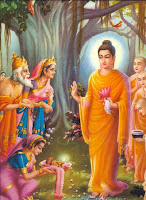Amber Larson, Dhr. Seven, Ashley Wells (eds.), Wisdom Quarterly Wiki edit; Alan Peto (video)
 |
| Who is the Buddha-to-come, Maitreya, the Friend of the World? (BahaiTeachings.org) |
.
 |
| Oh, young man, marry our beautiful daughter. - No. |
In the Nikāyas, this pair of qualities is often named as a pair, kataññuta and katavedita. The first term refers to acknowledgement of indebtedness to others, the second to repaying such a debt [Notes 2, 3].
Buddhist texts often encourage children from the age of discretion to take care of their parents, remember their gratitude toward them, honor them, and do everything they can to repay this gratitude [4, 5].
The care and attention parents have given their child is seen as deserving of full acknowledgment from that child. In a discourse called the Sigalaka Sutra, several ways are mentioned in which a child can repay its parents:
- "I will perform duties incumbent on them.
- I will keep up the lineage and tradition (Pali kula vaṃsa) of my family.
- I will make myself worthy of my heritage."
.
 |
| Sakka, King of the Devas, as Magha/Michael the Archangel |
The first vow he kept is, "As long as I live, may I maintain my parents." This vow is also cited in the commentary to the Dhammapada, indicating the impact of filial devotion during that period [6].
However, in an early discourse called Kataññu Sutra, the Buddha describes through several metaphors the difficulty in repaying one's gratitude toward one's parents only through material means only [1].
The sutras say that even if children were to carry their parents on their backs their entire lives, or set them up as kings and queens of the country, they would still not have repaid the great debt to their parents [7].
Eventually, the Buddha concludes that it is only possible to repay one's gratitude by teaching one's parents the Dharma [what we now call Buddhism] through spiritual qualities, such as confidence/faith (saddha) in Buddhism, virtue/morality, letting go/generosity, and wisdom/insight [8].
 |
| Even famous Elvis had parents he loved. |
In a third early discourse called Sabrahmā Sutra, parents are described as worthy of respect and gifts, because they have given children their start and were the ones who educated their children in their formative years [10, 11].
Furthermore, parents have provided the basic requirements for the child to survive [12].
Children who attempt to pay back their debt to their parents by providing for them are considered "superior people" (Pali sappurisa) expected to go to a heavenly rebirth in the next life, the afterlife, whereas people who are negligent in this, are called "outcasts" (Pali vasala) [13]. More























































































































































































































































No comments:
Post a Comment